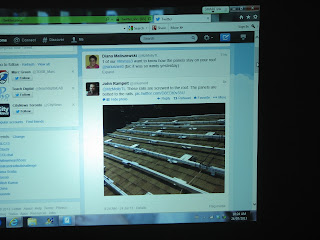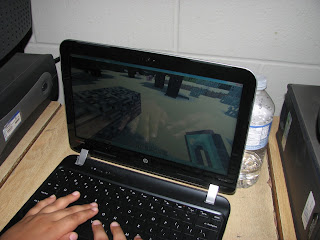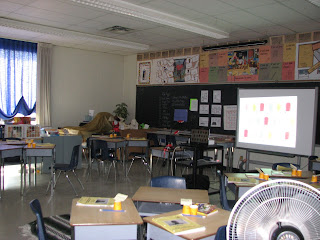A) The Robot Builder - James Maliszewski
When I first learned that my summer school class was supposed to focus on science and engineering involving the construction of solar-powered robots, I became very anxious. My administration allowed me to take home one of the kits to experiment. I had a rough time but my patient and helpful husband worked with me to build my robot dog. Thankfully, he agreed to come into the classroom and work individually with the students to help them build their creations. He came for five days and my students appreciated his time.
 B) The Solar Panel Expert - John Rampelt
B) The Solar Panel Expert - John RampeltWe had a Twitter chat on Wednesday, July 24 with @siriusnerd, otherwise known as John Rampelt, a high school teacher in the Waterloo region. I follow John on Twitter and a few weeks prior, I noticed a tweet he had shared about his newly installed solar panels on the roof of his house. He very kindly agreed to answer some questions via Twitter. I've done a Skype chat with a class before but this was the first time I've done something like this with Twitter. It was a huge success. The students even ignored the recess bell and continued to ask questions and monitor the Twitter feed for a solid 45 minutes! They were so excited and all of us learned so much about what using solar power for big projects can involve. We loved it! John was so knowledgeable and willing to share.

C) The Ice Cream Vendor - Ken
How does the sun affect regular people? Our ice cream man showed us. He came on July 24 and gave the students a sneak peek on the inside of his ice cream truck. Everyone asked a question (and they were good questions). The icing on the cake was purchasing ice cream at the end - or should I say it was the cherry on top of the ice cream sundae? Ken was very approachable and friendly and the students (and I) were fascinated by all the things we learned about what on the surface looks like a simple business.
D) The Public Librarian - Annalisa
On our last day, we took a trip to the Malvern branch of the Toronto Public Library. Annalisa did a short session with the class, promoting the TD TPL Summer Reading Program, reading some funny picture books, and giving us a tour of the beautiful and large library. She made the visit engaging and informative. A couple of students received their very first library cards and many students borrowed books to take home.
To my surprise and delight, I received a couple of thank you cards from my students, with some very touching comments written. I think our time together made an imprint on all of us. I want to thank the students themselves, for their willingness to try new things, work so hard, and collaborate with new friends. The parents also deserve recognition for diligently bringing their children to summer school and supporting our experiments. Last, but not least, I must acknowledge Liz Holder, the school principal, and Mythili Thedchanamoorthy, the site coach, for their financial and moral support for all the crazy activities we tried.










